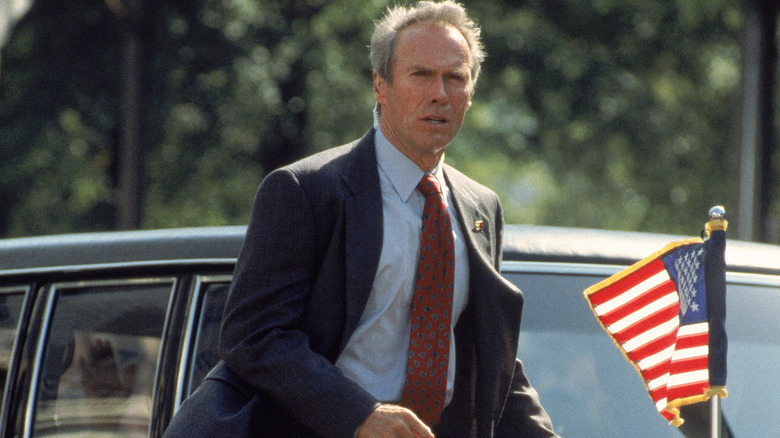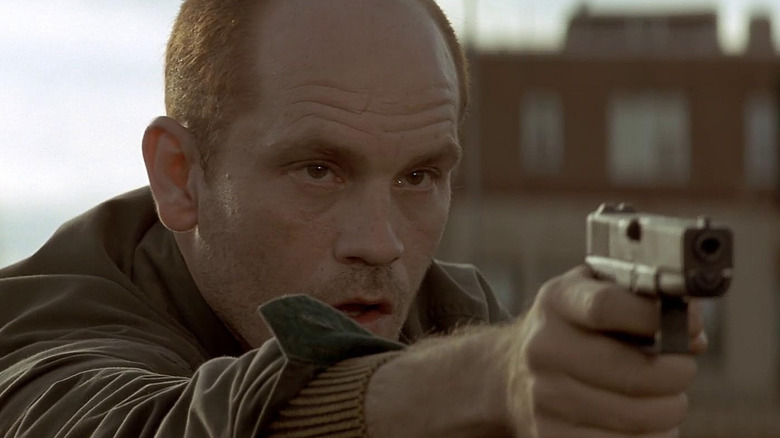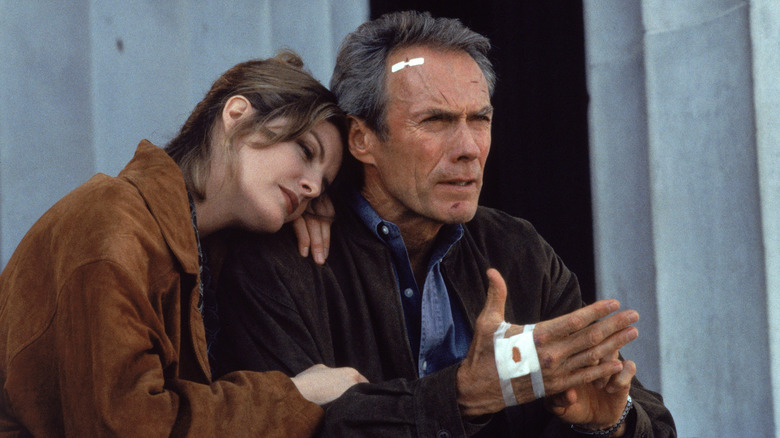The Clint Eastwood Thriller That President Bill Clinton Adored
In between looking after the well-being of the nation and forging strong relationships overseas, the President of the United States sometimes finds a few spare hours to catch a flick. Luckily, they don't need to catch a motorcade down to the local multiplex and queue up like the rest of us. Instead, there is a small movie theater in the East Wing of White House where the President can enjoy a movie with his family and guests. Harry Truman was a fan of "My Darling Clementine" while John F. Kennedy preferred the adventures of James Bond in "Dr. No." More recently, Bill Clinton loved "High Noon" so much that he screened the classic Western 20 times during his residency at the White House. He also had some very positive things to say about another more contemporary movie directly related to his day job: Wolfgang Petersen's "In the Line of Fire."
Starring Clint Eastwood (in his last action movie role), John Malkovich, and Rene Russo, "In the Line of Fire" was released in 1993 at a time when Oliver Stone's controversial "JFK" was still fresh in everyone's memory. Evoking the terrible events of November 22, 1963 in Dallas, Texas, Petersen's political thriller puts us in the sensible shoes of the people with one of the highest-stakes jobs in the country: The U.S. Secret Service agents whose duty involves putting their own lives on the line to save the President in the event of an assassination attempt. President Clinton, who himself became the target of a botched shooting at the White House the following year, heaped praise on "In the Line of Fire" during an interview with Larry King (via The Buffalo News):
"I thought Eastwood was terrific. . . . I liked the movie very much. . . . I think it was as realistic as it could be and still be a real rip-roaring thriller."
Wolfgang Petersen and producer Jeff Apple chose not to quote Clinton's mini-review during the publicity campaign for the movie, but "In the Line of Fire" did just fine at the box office without the President's seal of approval on the poster. It raked in $187 million at the box office from a $40 million budget and earned three Academy Award nominations: Best Supporting Actor (Malkovich), Original Screenplay, and Editing.
Let's take a closer look at the movie and how it holds up today.
What happens in In the Line of Fire?
Clint Eastwood stars as Frank Horrigan, a grizzled U.S. Secret Service agent with a maverick reputation. His gruff demeanor masks a deep sense of guilt, however, as he is the last surviving agent who was on active protective duty the day President John F. Kennedy was assassinated in Dallas, Texas. Haunted by his inability to save the President, Horrigan turned to drink, causing his wife and child to leave him. Now he's pretty level again, but all his doubts and fears re-emerge when a new killer aims to repeat history for him.
That man is Mitch Leary (John Malkovich), a former CIA agent who is now a rogue "wet boy" seeking revenge on his former employers. Leary has more disguises than Inspector Clouseau, using them to evade detection as he lays the groundwork for a fiendish plan that will get him within touching distance of the current POTUS. He also forms a peculiar attachment to Horrigan, taunting him about that day on Deeley Plaza and questioning his suitability for the job — should he really be protecting the President if he's not prepared to take a bullet for him?
Horrigan is determined to stop Leary and asks for reassignment to the Presidential Protective Division where he clashes with Bill Watts (Gary Cole), the uptight head of the security detail, and starts a tentative relationship with fellow agent Lily Raines (Rene Russo). Doubts about his age, fitness, and judgement get him kicked off the job, and things get even more personal when Leary kills Horrigan's partner during a rooftop chase. Eventually, Horrigan cracks the case and figures out how Leary plans to kill the President — but will he put himself in the line of fire this time?
"In the Line of Fire" is a gripping movie that deserves a place alongside classic '70s paranoid political thrillers such as Francis Ford Coppola's "The Conversation," "The Parallax View," and "Three Days of the Condor." Unlike "The Fugitive" (released the same year) it doesn't have many spectacular action set pieces, but Wolfgang Petersen successfully builds up the suspense as Leary nears his target. The whole cast is made up of very familiar faces, but the movie crackles the most in the tense conversations between Eastwood and Malkovich — the latter fully deserved his Oscar nod.
In the Line of Fire makes a good double bill with Unforgiven
"In the Line of Fire" came a year after Clint Eastwood's "Unforgiven," for which he took home the first Academy Award of his career (Best Picture) and received two more nods (Best Director and Best Actor). At the time, it was surprising that Eastwood took a step away from directing, especially while he was riding so high, but he saw it as a chance to take a break. Nevertheless, it still feels very much like an Eastwood picture: Wolfgang Petersen adapted his style to match Eastwood's straightforward approach; Ennio Morricone scored his first Eastwood film since the "Dollars Trilogy;" and Jeff Maguire's character-focused screenplay allowed Eastwood to explore similar themes that he had tackled so successfully in "Unforgiven."
If Eastwood's acclaimed revisionist Western reckoned with his Man With No Name persona, "In the Line of Fire" feels like a conversation with the "Dirty Harry" movies. It starts with Horrigan waving a big gun around and using his sensitive partner to dangerously call the bluff of a ruthless counterfeiter, and the ghost of Harry Callahan enters the room every time Horrigan shows complete disdain for his superiors.
But we also see a more vulnerable side to Eastwood's caricatured tough cop. He's dismissed as a dinosaur by his colleagues, and he struggles with the physical demands of the job. There is an awkward sweetness to his clumsy attempts to flirt with Raines, and a sincerity to how Eastwood portrays Horrigan's personal demons. A scene when Horrigan almost breaks down in tears recalling the day of the Kennedy assassination shows him for what he is: an aging man full of regret, who is terrified that he won't get a chance to make amends.
Eastwood is matched by a brilliant performance from John Malkovich as Mitch Leary. Malkovich's streak of villainous roles are relative outliers compared to his other work, and Leary is one of his finest baddies. Leary is calculating and ruthless, but he is also capable of making errors, usually spelling death for anyone who might report him. Malkovich's quiet, supercilious diction is a great contrast to Eastwood's more forthright style, and we get a genuine sense that Leary takes perverse delight in torturing Horrigan about his past mistakes. Overall, "In the Line of Fire" is a gripping and intelligent thriller fit for a President.


